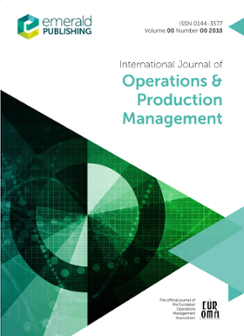The boundary-spanning role of first-tier suppliers in sustainability-oriented supplier development initiatives
IF 7.4
2区 管理学
Q1 MANAGEMENT
International Journal of Operations & Production Management
Pub Date : 2021-10-11
DOI:10.1108/ijopm-12-2020-0856
引用次数: 14
Abstract
PurposeThis study aims to study how first-tier suppliers (FTs) operate as boundary-spanners between the focal firm and second-tier suppliers (STs) in extending sustainability-oriented supplier development (SSD) initiatives up the supply chain.Design/methodology/approachAn exploratory multi-case study approach in the apparel industry is adopted, comprised of four cases focused on occupational health and safety issues. The paper uses primary semi-structured interviews and observation data and secondary documents, and it is informed by the boundary-spanning and social capital theory.FindingsThe influence of downstream social capital on the upstream boundary-spanning actions of FTs is highlighted. More specifically, it is found that the cognitive and relational capital that exists in the downstream relationship between an FT and the focal firm affects whether the FT adopts compliance- or improvement-oriented boundary-spanning actions in their upstream relationships with STs. Particularly important aspects of cognitive and relational capital are highlighted while the phenomenon of FTs adding their own personal interpretation to sustainability requirements when fulfilling their boundary-spanning role is identified.Research limitations/implicationsA distinction is made between compliance- and improvement-oriented boundary-spanning actions. A deeper insight into the boundary-spanning role of FTs in extending SSD initiatives up the supply chain to STs is provided along with a deeper understanding of how this role is impacted by social capital.Practical implicationsFocal firms should seek to build adequate cognitive and relational capital with their FTs before deploying SSD initiatives to extend their reach further upstream in the supply chain. In doing so, it is also important to be cognisant of the social capital that exists between FTs and STs.Originality/valueThe paper contributes to the SSD literature by going beyond the buyer–FT dyad to examine the FT's boundary-spanning role in the wider buyer–FT–ST chain relationship. The study theoretically and empirically draws out the importance of relation-specific assets through the social capital lens.一级供应商在面向可持续发展的供应商发展倡议中的跨界作用
目的本研究旨在研究一级供应商(FT)如何作为重点公司和二级供应商(ST)之间的边界扳手,将面向可持续性的供应商发展(SSD)计划延伸到供应链的上游。设计/方法/方法采用服装行业的探索性多案例研究方法,包括四个关注职业健康和安全问题的案例。本文采用了一次半结构化访谈、观察数据和二次文献,并运用了边界跨越和社会资本理论。研究发现,下游社会资本对金融机构上游跨界行为的影响较为突出。更具体地说,研究发现,金融时报和焦点公司之间下游关系中存在的认知和关系资本会影响金融时报在与ST的上游关系中是否采取合规或改进导向的跨界行动。认知资本和关系资本的特别重要的方面得到了强调,同时FT在履行其跨越边界的角色时,将自己的个人解释添加到可持续性要求中的现象也得到了确认。研究局限性/含义在以合规和改进为导向的跨界行动之间进行区分。对FT在将SSD计划向供应链上游扩展到ST方面的跨边界作用有了更深入的了解,同时也对社会资本如何影响这一作用有了更深的理解。实际含义重点公司在部署SSD计划以进一步扩大其在供应链上游的影响力之前,应寻求与FT建立足够的认知和关系资本。在这样做的过程中,认识到FT和ST之间存在的社会资本也很重要。原创性/价值本文通过超越买方-FT二元体来研究FT在更广泛的买方-FT-ST链关系中的跨边界作用,为SSD文献做出了贡献。本研究通过社会资本视角,从理论和实证两个方面揭示了特定关系资产的重要性。
本文章由计算机程序翻译,如有差异,请以英文原文为准。
求助全文
约1分钟内获得全文
求助全文
来源期刊
CiteScore
13.30
自引率
17.20%
发文量
96
期刊介绍:
The mission of the International Journal of Operations & Production Management (IJOPM) is to publish cutting-edge, innovative research with the potential to significantly advance the field of Operations and Supply Chain Management, both in theory and practice. Drawing on experiences from manufacturing and service sectors, in both private and public contexts, the journal has earned widespread respect in this complex and increasingly vital area of business management.
Methodologically, IJOPM encompasses a broad spectrum of empirically-based inquiry using suitable research frameworks, as long as they offer generic insights of substantial value to operations and supply chain management. While the journal does not categorically exclude specific empirical methodologies, it does not accept purely mathematical modeling pieces. Regardless of the chosen mode of inquiry or methods employed, the key criteria are appropriateness of methodology, clarity in the study's execution, and rigor in the application of methods. It's important to note that any contribution should explicitly contribute to theory. The journal actively encourages the use of mixed methods where appropriate and valuable for generating research insights.

 求助内容:
求助内容: 应助结果提醒方式:
应助结果提醒方式:


